Analyzing the Extraordinary Changes in Democracy by IT
VerifiedAdded on 2021/05/31
|9
|2339
|59
Essay
AI Summary
This essay provides a comprehensive analysis of the profound impact of information technology on democracy. It explores the positive effects, such as enhanced political mobilization, communitarian democracy, and increased transparency in governance through the use of big data and open data initiatives. The essay also addresses negative impacts, including threats to dictatorial regimes and ethical concerns related to data privacy and electoral manipulation. It examines the role of social media in shaping political processes, influencing elections, and facilitating both democratic movements and the spread of misinformation. The essay highlights the evolving relationship between technology and democracy, emphasizing the need for ethical considerations and responsible use of information technology to safeguard democratic values. The essay also discusses the ways in which digital technology has revolutionized the way social science is taught, done, and disseminated, and the ethical issues that arise from these changes.
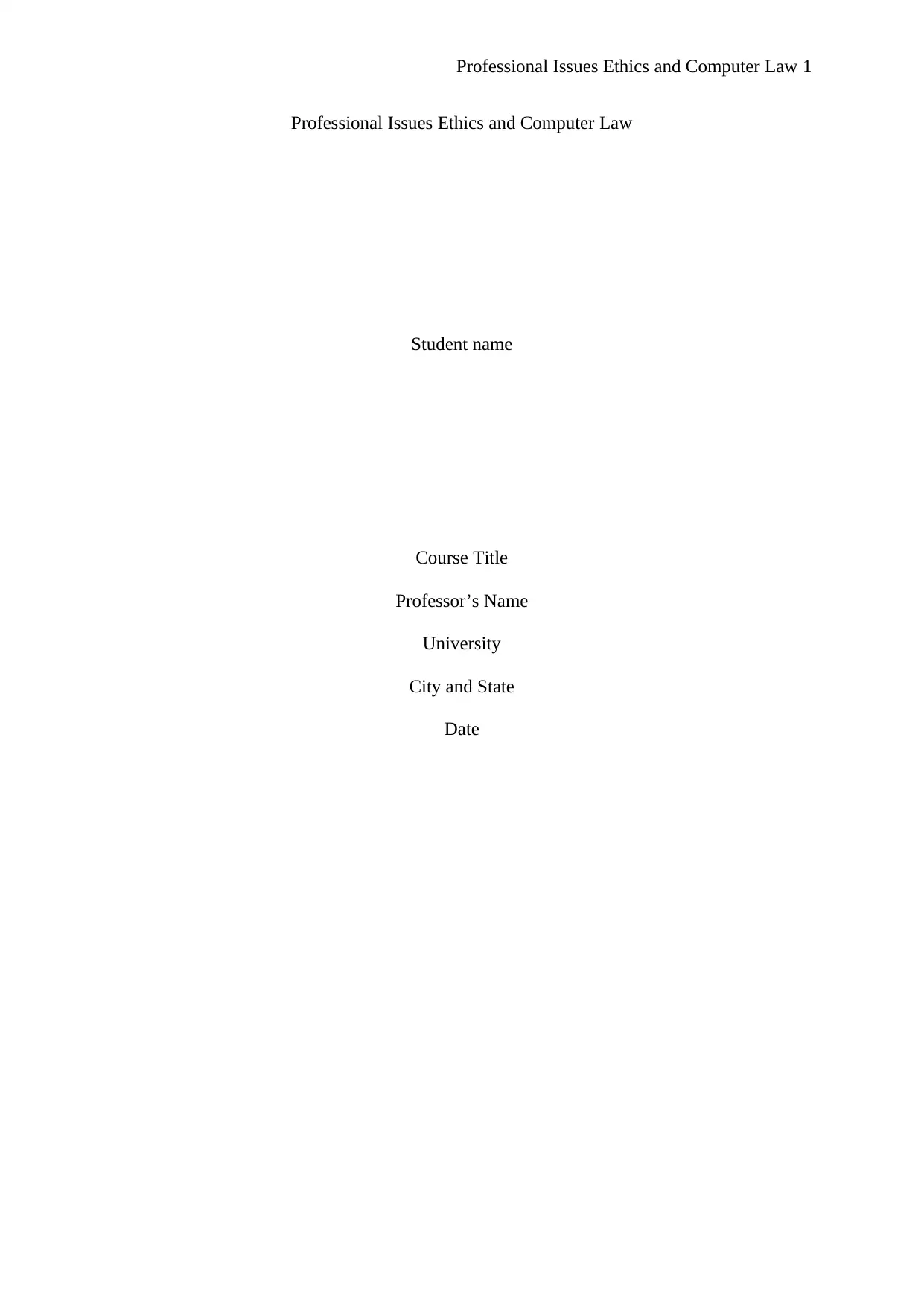
Professional Issues Ethics and Computer Law 1
Professional Issues Ethics and Computer Law
Student name
Course Title
Professor’s Name
University
City and State
Date
Professional Issues Ethics and Computer Law
Student name
Course Title
Professor’s Name
University
City and State
Date
Paraphrase This Document
Need a fresh take? Get an instant paraphrase of this document with our AI Paraphraser
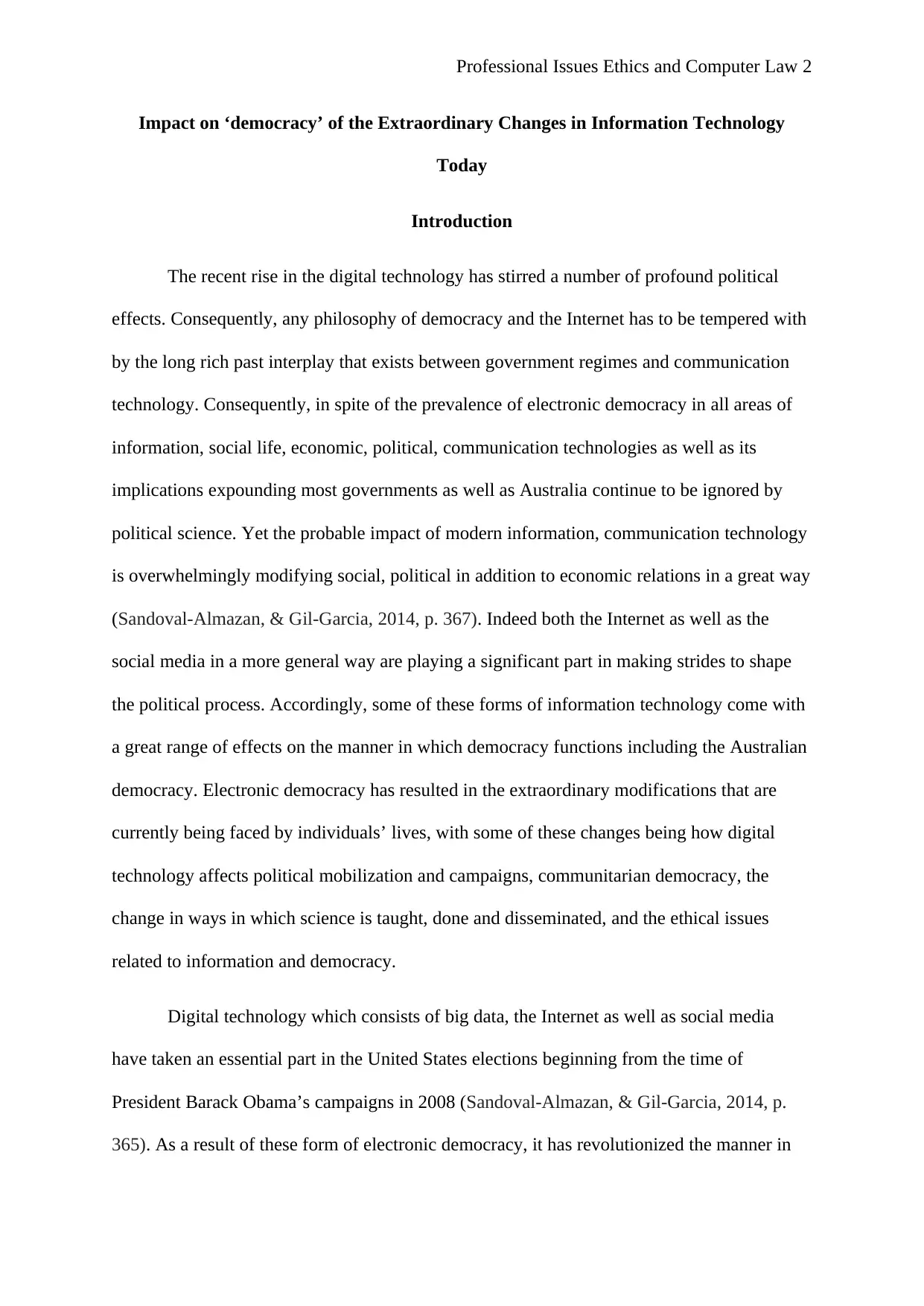
Professional Issues Ethics and Computer Law 2
Impact on ‘democracy’ of the Extraordinary Changes in Information Technology
Today
Introduction
The recent rise in the digital technology has stirred a number of profound political
effects. Consequently, any philosophy of democracy and the Internet has to be tempered with
by the long rich past interplay that exists between government regimes and communication
technology. Consequently, in spite of the prevalence of electronic democracy in all areas of
information, social life, economic, political, communication technologies as well as its
implications expounding most governments as well as Australia continue to be ignored by
political science. Yet the probable impact of modern information, communication technology
is overwhelmingly modifying social, political in addition to economic relations in a great way
(Sandoval-Almazan, & Gil-Garcia, 2014, p. 367). Indeed both the Internet as well as the
social media in a more general way are playing a significant part in making strides to shape
the political process. Accordingly, some of these forms of information technology come with
a great range of effects on the manner in which democracy functions including the Australian
democracy. Electronic democracy has resulted in the extraordinary modifications that are
currently being faced by individuals’ lives, with some of these changes being how digital
technology affects political mobilization and campaigns, communitarian democracy, the
change in ways in which science is taught, done and disseminated, and the ethical issues
related to information and democracy.
Digital technology which consists of big data, the Internet as well as social media
have taken an essential part in the United States elections beginning from the time of
President Barack Obama’s campaigns in 2008 (Sandoval-Almazan, & Gil-Garcia, 2014, p.
365). As a result of these form of electronic democracy, it has revolutionized the manner in
Impact on ‘democracy’ of the Extraordinary Changes in Information Technology
Today
Introduction
The recent rise in the digital technology has stirred a number of profound political
effects. Consequently, any philosophy of democracy and the Internet has to be tempered with
by the long rich past interplay that exists between government regimes and communication
technology. Consequently, in spite of the prevalence of electronic democracy in all areas of
information, social life, economic, political, communication technologies as well as its
implications expounding most governments as well as Australia continue to be ignored by
political science. Yet the probable impact of modern information, communication technology
is overwhelmingly modifying social, political in addition to economic relations in a great way
(Sandoval-Almazan, & Gil-Garcia, 2014, p. 367). Indeed both the Internet as well as the
social media in a more general way are playing a significant part in making strides to shape
the political process. Accordingly, some of these forms of information technology come with
a great range of effects on the manner in which democracy functions including the Australian
democracy. Electronic democracy has resulted in the extraordinary modifications that are
currently being faced by individuals’ lives, with some of these changes being how digital
technology affects political mobilization and campaigns, communitarian democracy, the
change in ways in which science is taught, done and disseminated, and the ethical issues
related to information and democracy.
Digital technology which consists of big data, the Internet as well as social media
have taken an essential part in the United States elections beginning from the time of
President Barack Obama’s campaigns in 2008 (Sandoval-Almazan, & Gil-Garcia, 2014, p.
365). As a result of these form of electronic democracy, it has revolutionized the manner in
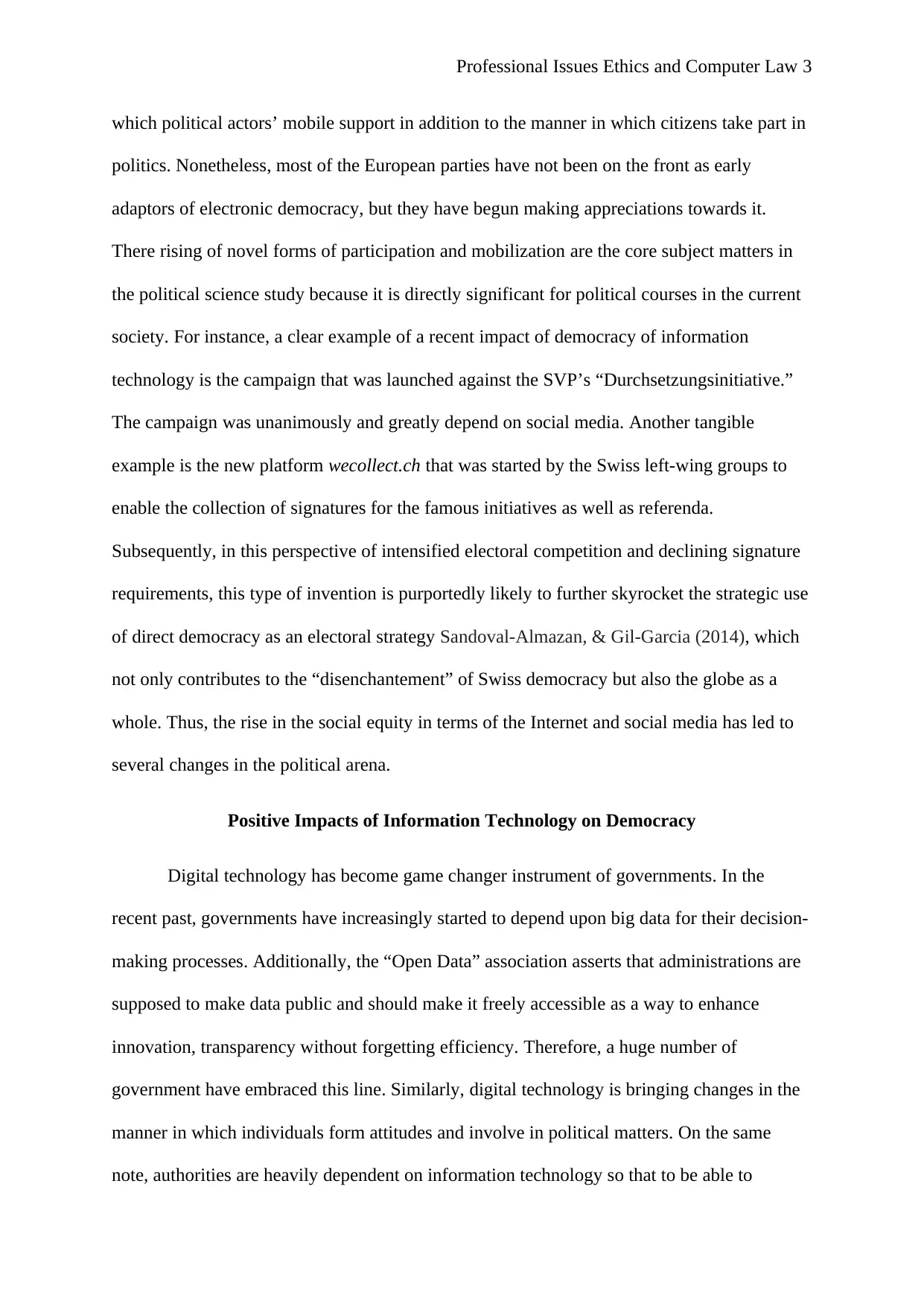
Professional Issues Ethics and Computer Law 3
which political actors’ mobile support in addition to the manner in which citizens take part in
politics. Nonetheless, most of the European parties have not been on the front as early
adaptors of electronic democracy, but they have begun making appreciations towards it.
There rising of novel forms of participation and mobilization are the core subject matters in
the political science study because it is directly significant for political courses in the current
society. For instance, a clear example of a recent impact of democracy of information
technology is the campaign that was launched against the SVP’s “Durchsetzungsinitiative.”
The campaign was unanimously and greatly depend on social media. Another tangible
example is the new platform wecollect.ch that was started by the Swiss left-wing groups to
enable the collection of signatures for the famous initiatives as well as referenda.
Subsequently, in this perspective of intensified electoral competition and declining signature
requirements, this type of invention is purportedly likely to further skyrocket the strategic use
of direct democracy as an electoral strategy Sandoval-Almazan, & Gil-Garcia (2014), which
not only contributes to the “disenchantement” of Swiss democracy but also the globe as a
whole. Thus, the rise in the social equity in terms of the Internet and social media has led to
several changes in the political arena.
Positive Impacts of Information Technology on Democracy
Digital technology has become game changer instrument of governments. In the
recent past, governments have increasingly started to depend upon big data for their decision-
making processes. Additionally, the “Open Data” association asserts that administrations are
supposed to make data public and should make it freely accessible as a way to enhance
innovation, transparency without forgetting efficiency. Therefore, a huge number of
government have embraced this line. Similarly, digital technology is bringing changes in the
manner in which individuals form attitudes and involve in political matters. On the same
note, authorities are heavily dependent on information technology so that to be able to
which political actors’ mobile support in addition to the manner in which citizens take part in
politics. Nonetheless, most of the European parties have not been on the front as early
adaptors of electronic democracy, but they have begun making appreciations towards it.
There rising of novel forms of participation and mobilization are the core subject matters in
the political science study because it is directly significant for political courses in the current
society. For instance, a clear example of a recent impact of democracy of information
technology is the campaign that was launched against the SVP’s “Durchsetzungsinitiative.”
The campaign was unanimously and greatly depend on social media. Another tangible
example is the new platform wecollect.ch that was started by the Swiss left-wing groups to
enable the collection of signatures for the famous initiatives as well as referenda.
Subsequently, in this perspective of intensified electoral competition and declining signature
requirements, this type of invention is purportedly likely to further skyrocket the strategic use
of direct democracy as an electoral strategy Sandoval-Almazan, & Gil-Garcia (2014), which
not only contributes to the “disenchantement” of Swiss democracy but also the globe as a
whole. Thus, the rise in the social equity in terms of the Internet and social media has led to
several changes in the political arena.
Positive Impacts of Information Technology on Democracy
Digital technology has become game changer instrument of governments. In the
recent past, governments have increasingly started to depend upon big data for their decision-
making processes. Additionally, the “Open Data” association asserts that administrations are
supposed to make data public and should make it freely accessible as a way to enhance
innovation, transparency without forgetting efficiency. Therefore, a huge number of
government have embraced this line. Similarly, digital technology is bringing changes in the
manner in which individuals form attitudes and involve in political matters. On the same
note, authorities are heavily dependent on information technology so that to be able to
⊘ This is a preview!⊘
Do you want full access?
Subscribe today to unlock all pages.

Trusted by 1+ million students worldwide
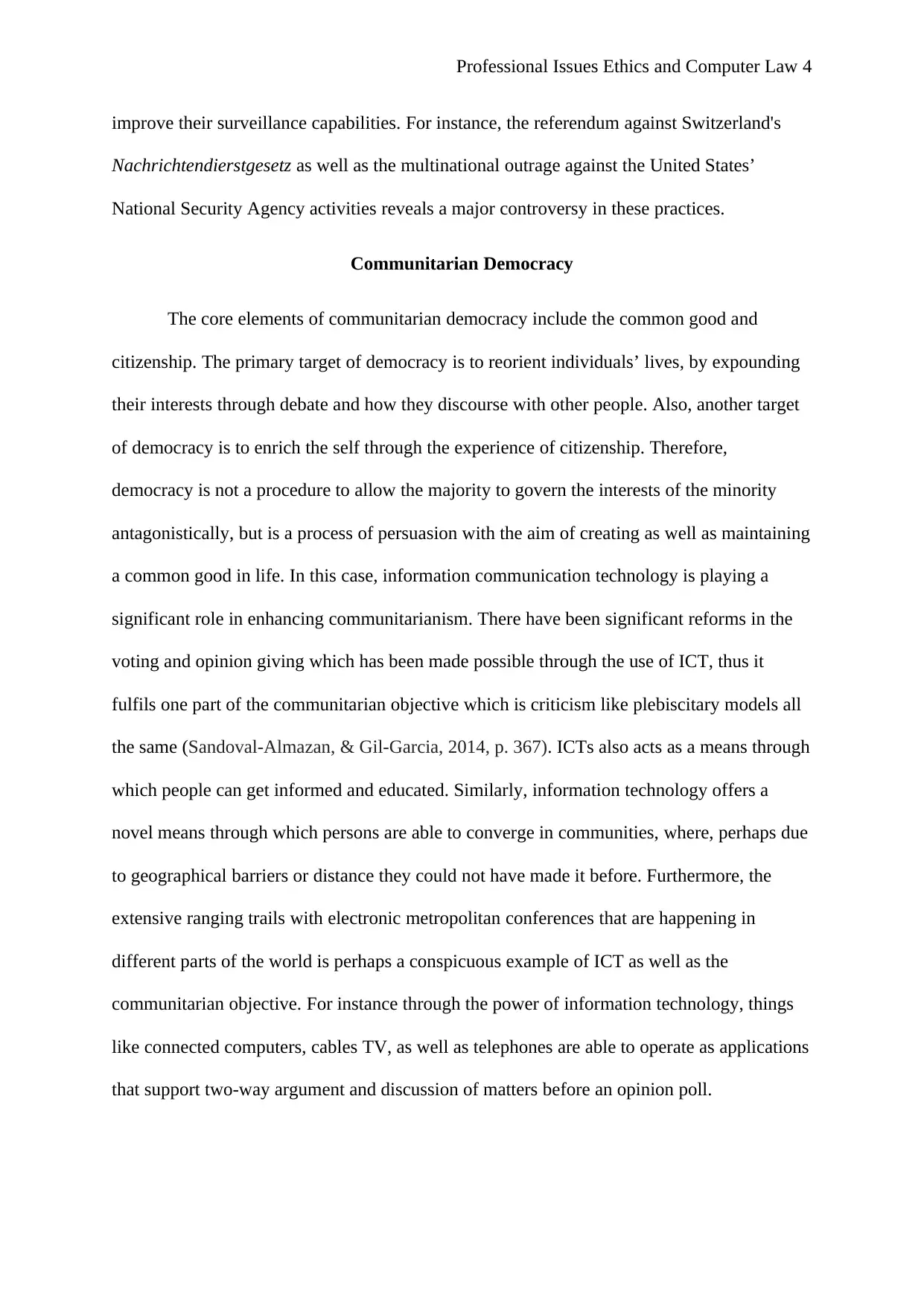
Professional Issues Ethics and Computer Law 4
improve their surveillance capabilities. For instance, the referendum against Switzerland's
Nachrichtendierstgesetz as well as the multinational outrage against the United States’
National Security Agency activities reveals a major controversy in these practices.
Communitarian Democracy
The core elements of communitarian democracy include the common good and
citizenship. The primary target of democracy is to reorient individuals’ lives, by expounding
their interests through debate and how they discourse with other people. Also, another target
of democracy is to enrich the self through the experience of citizenship. Therefore,
democracy is not a procedure to allow the majority to govern the interests of the minority
antagonistically, but is a process of persuasion with the aim of creating as well as maintaining
a common good in life. In this case, information communication technology is playing a
significant role in enhancing communitarianism. There have been significant reforms in the
voting and opinion giving which has been made possible through the use of ICT, thus it
fulfils one part of the communitarian objective which is criticism like plebiscitary models all
the same (Sandoval-Almazan, & Gil-Garcia, 2014, p. 367). ICTs also acts as a means through
which people can get informed and educated. Similarly, information technology offers a
novel means through which persons are able to converge in communities, where, perhaps due
to geographical barriers or distance they could not have made it before. Furthermore, the
extensive ranging trails with electronic metropolitan conferences that are happening in
different parts of the world is perhaps a conspicuous example of ICT as well as the
communitarian objective. For instance through the power of information technology, things
like connected computers, cables TV, as well as telephones are able to operate as applications
that support two-way argument and discussion of matters before an opinion poll.
improve their surveillance capabilities. For instance, the referendum against Switzerland's
Nachrichtendierstgesetz as well as the multinational outrage against the United States’
National Security Agency activities reveals a major controversy in these practices.
Communitarian Democracy
The core elements of communitarian democracy include the common good and
citizenship. The primary target of democracy is to reorient individuals’ lives, by expounding
their interests through debate and how they discourse with other people. Also, another target
of democracy is to enrich the self through the experience of citizenship. Therefore,
democracy is not a procedure to allow the majority to govern the interests of the minority
antagonistically, but is a process of persuasion with the aim of creating as well as maintaining
a common good in life. In this case, information communication technology is playing a
significant role in enhancing communitarianism. There have been significant reforms in the
voting and opinion giving which has been made possible through the use of ICT, thus it
fulfils one part of the communitarian objective which is criticism like plebiscitary models all
the same (Sandoval-Almazan, & Gil-Garcia, 2014, p. 367). ICTs also acts as a means through
which people can get informed and educated. Similarly, information technology offers a
novel means through which persons are able to converge in communities, where, perhaps due
to geographical barriers or distance they could not have made it before. Furthermore, the
extensive ranging trails with electronic metropolitan conferences that are happening in
different parts of the world is perhaps a conspicuous example of ICT as well as the
communitarian objective. For instance through the power of information technology, things
like connected computers, cables TV, as well as telephones are able to operate as applications
that support two-way argument and discussion of matters before an opinion poll.
Paraphrase This Document
Need a fresh take? Get an instant paraphrase of this document with our AI Paraphraser
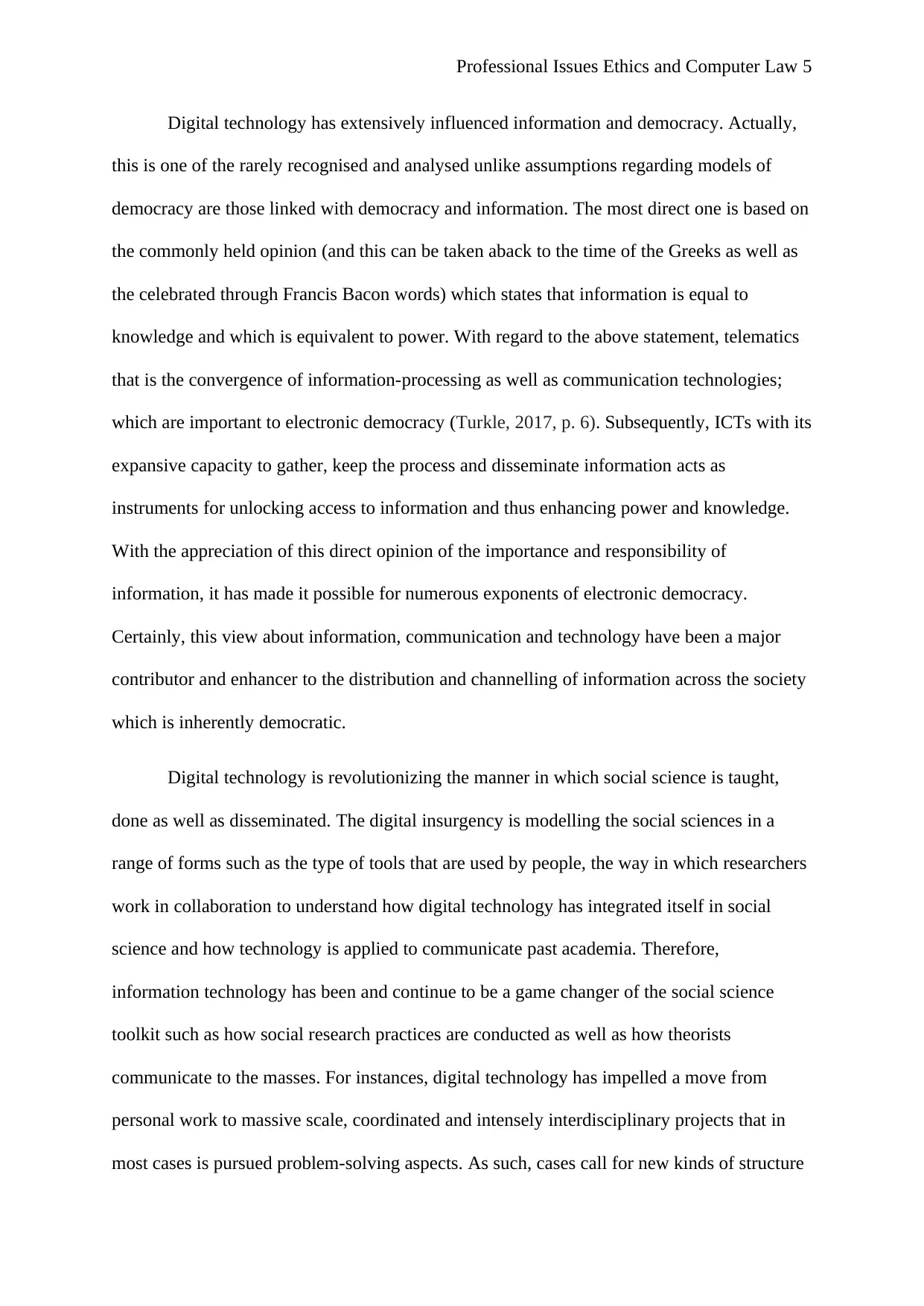
Professional Issues Ethics and Computer Law 5
Digital technology has extensively influenced information and democracy. Actually,
this is one of the rarely recognised and analysed unlike assumptions regarding models of
democracy are those linked with democracy and information. The most direct one is based on
the commonly held opinion (and this can be taken aback to the time of the Greeks as well as
the celebrated through Francis Bacon words) which states that information is equal to
knowledge and which is equivalent to power. With regard to the above statement, telematics
that is the convergence of information-processing as well as communication technologies;
which are important to electronic democracy (Turkle, 2017, p. 6). Subsequently, ICTs with its
expansive capacity to gather, keep the process and disseminate information acts as
instruments for unlocking access to information and thus enhancing power and knowledge.
With the appreciation of this direct opinion of the importance and responsibility of
information, it has made it possible for numerous exponents of electronic democracy.
Certainly, this view about information, communication and technology have been a major
contributor and enhancer to the distribution and channelling of information across the society
which is inherently democratic.
Digital technology is revolutionizing the manner in which social science is taught,
done as well as disseminated. The digital insurgency is modelling the social sciences in a
range of forms such as the type of tools that are used by people, the way in which researchers
work in collaboration to understand how digital technology has integrated itself in social
science and how technology is applied to communicate past academia. Therefore,
information technology has been and continue to be a game changer of the social science
toolkit such as how social research practices are conducted as well as how theorists
communicate to the masses. For instances, digital technology has impelled a move from
personal work to massive scale, coordinated and intensely interdisciplinary projects that in
most cases is pursued problem-solving aspects. As such, cases call for new kinds of structure
Digital technology has extensively influenced information and democracy. Actually,
this is one of the rarely recognised and analysed unlike assumptions regarding models of
democracy are those linked with democracy and information. The most direct one is based on
the commonly held opinion (and this can be taken aback to the time of the Greeks as well as
the celebrated through Francis Bacon words) which states that information is equal to
knowledge and which is equivalent to power. With regard to the above statement, telematics
that is the convergence of information-processing as well as communication technologies;
which are important to electronic democracy (Turkle, 2017, p. 6). Subsequently, ICTs with its
expansive capacity to gather, keep the process and disseminate information acts as
instruments for unlocking access to information and thus enhancing power and knowledge.
With the appreciation of this direct opinion of the importance and responsibility of
information, it has made it possible for numerous exponents of electronic democracy.
Certainly, this view about information, communication and technology have been a major
contributor and enhancer to the distribution and channelling of information across the society
which is inherently democratic.
Digital technology is revolutionizing the manner in which social science is taught,
done as well as disseminated. The digital insurgency is modelling the social sciences in a
range of forms such as the type of tools that are used by people, the way in which researchers
work in collaboration to understand how digital technology has integrated itself in social
science and how technology is applied to communicate past academia. Therefore,
information technology has been and continue to be a game changer of the social science
toolkit such as how social research practices are conducted as well as how theorists
communicate to the masses. For instances, digital technology has impelled a move from
personal work to massive scale, coordinated and intensely interdisciplinary projects that in
most cases is pursued problem-solving aspects. As such, cases call for new kinds of structure
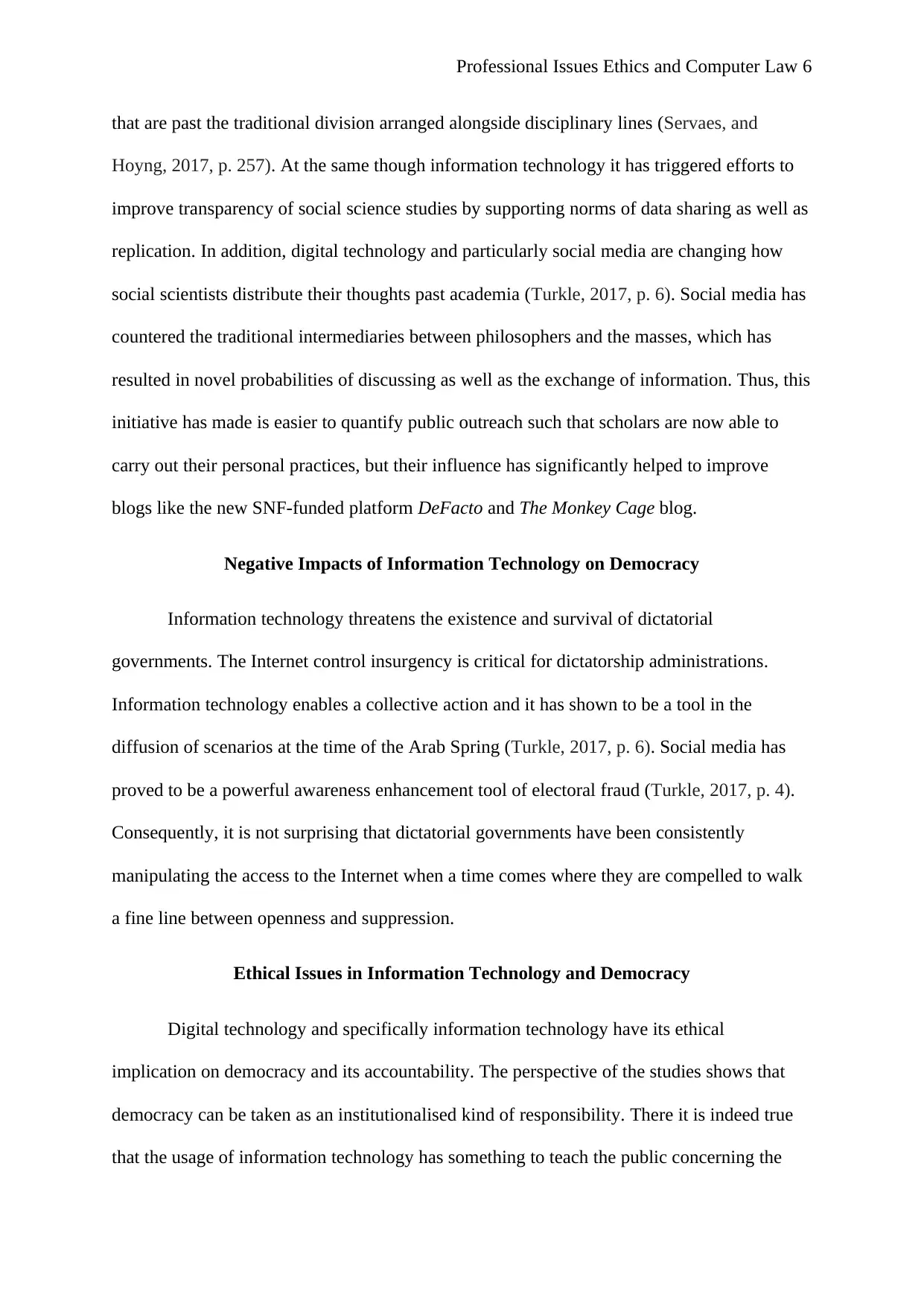
Professional Issues Ethics and Computer Law 6
that are past the traditional division arranged alongside disciplinary lines (Servaes, and
Hoyng, 2017, p. 257). At the same though information technology it has triggered efforts to
improve transparency of social science studies by supporting norms of data sharing as well as
replication. In addition, digital technology and particularly social media are changing how
social scientists distribute their thoughts past academia (Turkle, 2017, p. 6). Social media has
countered the traditional intermediaries between philosophers and the masses, which has
resulted in novel probabilities of discussing as well as the exchange of information. Thus, this
initiative has made is easier to quantify public outreach such that scholars are now able to
carry out their personal practices, but their influence has significantly helped to improve
blogs like the new SNF-funded platform DeFacto and The Monkey Cage blog.
Negative Impacts of Information Technology on Democracy
Information technology threatens the existence and survival of dictatorial
governments. The Internet control insurgency is critical for dictatorship administrations.
Information technology enables a collective action and it has shown to be a tool in the
diffusion of scenarios at the time of the Arab Spring (Turkle, 2017, p. 6). Social media has
proved to be a powerful awareness enhancement tool of electoral fraud (Turkle, 2017, p. 4).
Consequently, it is not surprising that dictatorial governments have been consistently
manipulating the access to the Internet when a time comes where they are compelled to walk
a fine line between openness and suppression.
Ethical Issues in Information Technology and Democracy
Digital technology and specifically information technology have its ethical
implication on democracy and its accountability. The perspective of the studies shows that
democracy can be taken as an institutionalised kind of responsibility. There it is indeed true
that the usage of information technology has something to teach the public concerning the
that are past the traditional division arranged alongside disciplinary lines (Servaes, and
Hoyng, 2017, p. 257). At the same though information technology it has triggered efforts to
improve transparency of social science studies by supporting norms of data sharing as well as
replication. In addition, digital technology and particularly social media are changing how
social scientists distribute their thoughts past academia (Turkle, 2017, p. 6). Social media has
countered the traditional intermediaries between philosophers and the masses, which has
resulted in novel probabilities of discussing as well as the exchange of information. Thus, this
initiative has made is easier to quantify public outreach such that scholars are now able to
carry out their personal practices, but their influence has significantly helped to improve
blogs like the new SNF-funded platform DeFacto and The Monkey Cage blog.
Negative Impacts of Information Technology on Democracy
Information technology threatens the existence and survival of dictatorial
governments. The Internet control insurgency is critical for dictatorship administrations.
Information technology enables a collective action and it has shown to be a tool in the
diffusion of scenarios at the time of the Arab Spring (Turkle, 2017, p. 6). Social media has
proved to be a powerful awareness enhancement tool of electoral fraud (Turkle, 2017, p. 4).
Consequently, it is not surprising that dictatorial governments have been consistently
manipulating the access to the Internet when a time comes where they are compelled to walk
a fine line between openness and suppression.
Ethical Issues in Information Technology and Democracy
Digital technology and specifically information technology have its ethical
implication on democracy and its accountability. The perspective of the studies shows that
democracy can be taken as an institutionalised kind of responsibility. There it is indeed true
that the usage of information technology has something to teach the public concerning the
⊘ This is a preview!⊘
Do you want full access?
Subscribe today to unlock all pages.

Trusted by 1+ million students worldwide
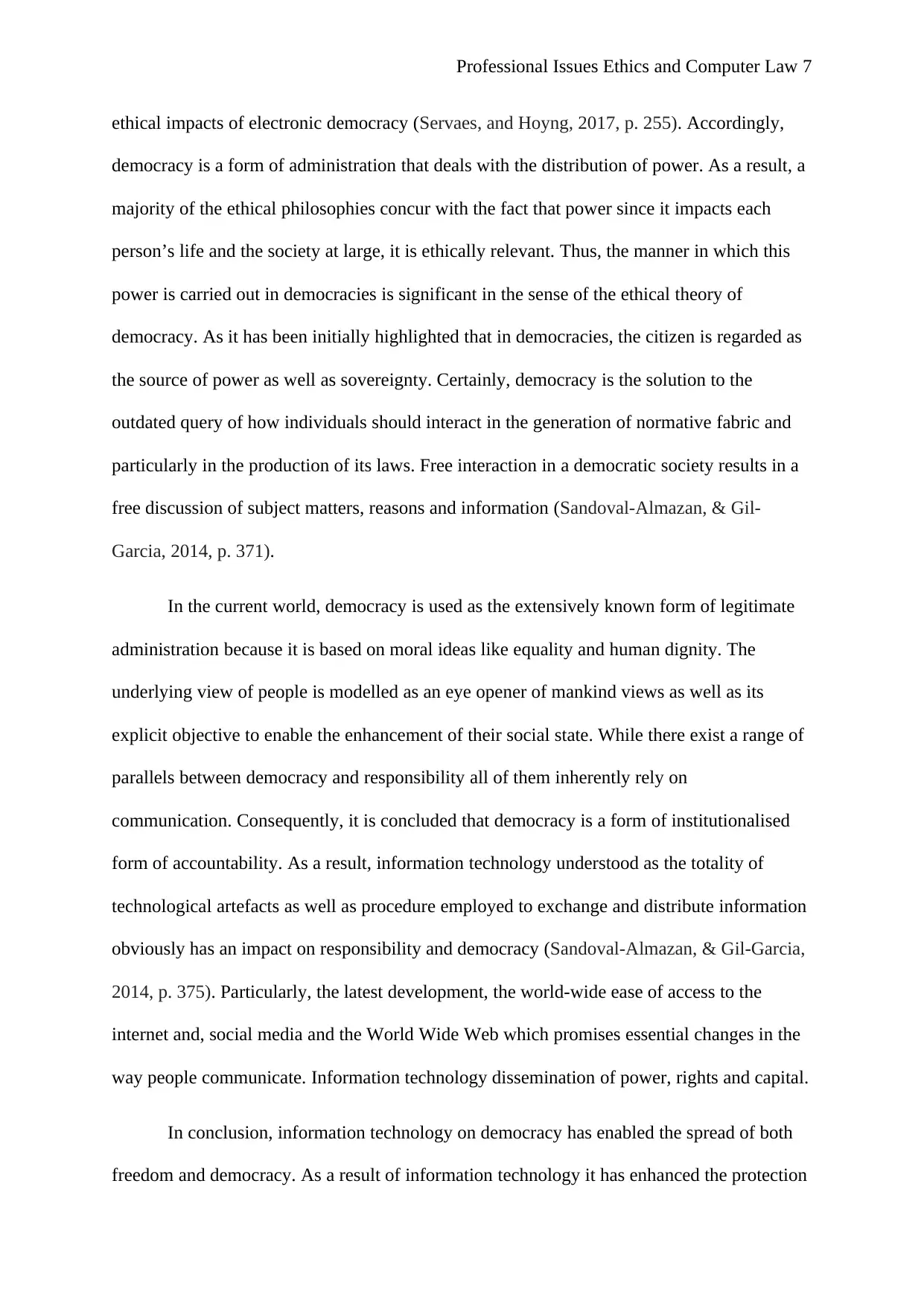
Professional Issues Ethics and Computer Law 7
ethical impacts of electronic democracy (Servaes, and Hoyng, 2017, p. 255). Accordingly,
democracy is a form of administration that deals with the distribution of power. As a result, a
majority of the ethical philosophies concur with the fact that power since it impacts each
person’s life and the society at large, it is ethically relevant. Thus, the manner in which this
power is carried out in democracies is significant in the sense of the ethical theory of
democracy. As it has been initially highlighted that in democracies, the citizen is regarded as
the source of power as well as sovereignty. Certainly, democracy is the solution to the
outdated query of how individuals should interact in the generation of normative fabric and
particularly in the production of its laws. Free interaction in a democratic society results in a
free discussion of subject matters, reasons and information (Sandoval-Almazan, & Gil-
Garcia, 2014, p. 371).
In the current world, democracy is used as the extensively known form of legitimate
administration because it is based on moral ideas like equality and human dignity. The
underlying view of people is modelled as an eye opener of mankind views as well as its
explicit objective to enable the enhancement of their social state. While there exist a range of
parallels between democracy and responsibility all of them inherently rely on
communication. Consequently, it is concluded that democracy is a form of institutionalised
form of accountability. As a result, information technology understood as the totality of
technological artefacts as well as procedure employed to exchange and distribute information
obviously has an impact on responsibility and democracy (Sandoval-Almazan, & Gil-Garcia,
2014, p. 375). Particularly, the latest development, the world-wide ease of access to the
internet and, social media and the World Wide Web which promises essential changes in the
way people communicate. Information technology dissemination of power, rights and capital.
In conclusion, information technology on democracy has enabled the spread of both
freedom and democracy. As a result of information technology it has enhanced the protection
ethical impacts of electronic democracy (Servaes, and Hoyng, 2017, p. 255). Accordingly,
democracy is a form of administration that deals with the distribution of power. As a result, a
majority of the ethical philosophies concur with the fact that power since it impacts each
person’s life and the society at large, it is ethically relevant. Thus, the manner in which this
power is carried out in democracies is significant in the sense of the ethical theory of
democracy. As it has been initially highlighted that in democracies, the citizen is regarded as
the source of power as well as sovereignty. Certainly, democracy is the solution to the
outdated query of how individuals should interact in the generation of normative fabric and
particularly in the production of its laws. Free interaction in a democratic society results in a
free discussion of subject matters, reasons and information (Sandoval-Almazan, & Gil-
Garcia, 2014, p. 371).
In the current world, democracy is used as the extensively known form of legitimate
administration because it is based on moral ideas like equality and human dignity. The
underlying view of people is modelled as an eye opener of mankind views as well as its
explicit objective to enable the enhancement of their social state. While there exist a range of
parallels between democracy and responsibility all of them inherently rely on
communication. Consequently, it is concluded that democracy is a form of institutionalised
form of accountability. As a result, information technology understood as the totality of
technological artefacts as well as procedure employed to exchange and distribute information
obviously has an impact on responsibility and democracy (Sandoval-Almazan, & Gil-Garcia,
2014, p. 375). Particularly, the latest development, the world-wide ease of access to the
internet and, social media and the World Wide Web which promises essential changes in the
way people communicate. Information technology dissemination of power, rights and capital.
In conclusion, information technology on democracy has enabled the spread of both
freedom and democracy. As a result of information technology it has enhanced the protection
Paraphrase This Document
Need a fresh take? Get an instant paraphrase of this document with our AI Paraphraser
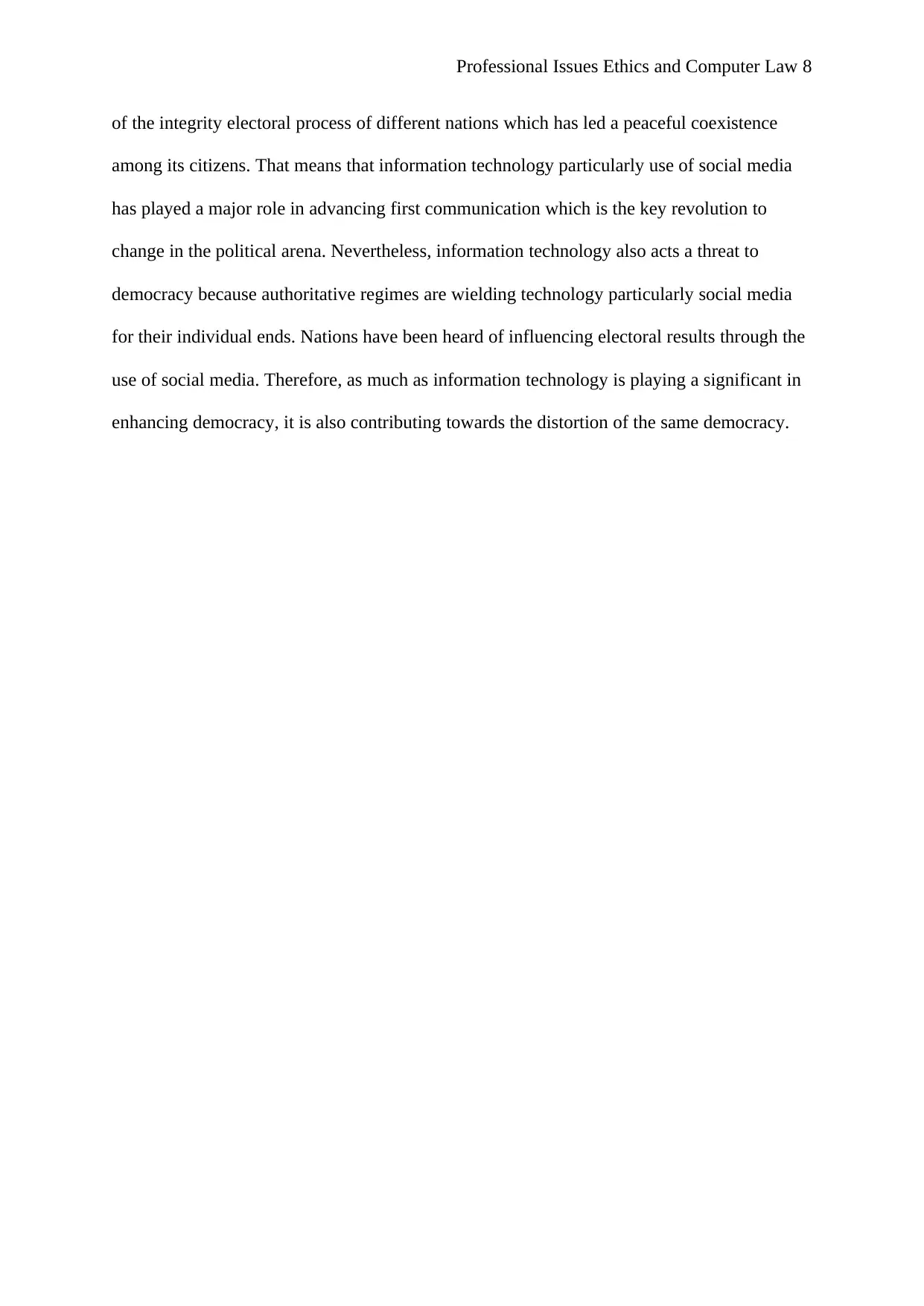
Professional Issues Ethics and Computer Law 8
of the integrity electoral process of different nations which has led a peaceful coexistence
among its citizens. That means that information technology particularly use of social media
has played a major role in advancing first communication which is the key revolution to
change in the political arena. Nevertheless, information technology also acts a threat to
democracy because authoritative regimes are wielding technology particularly social media
for their individual ends. Nations have been heard of influencing electoral results through the
use of social media. Therefore, as much as information technology is playing a significant in
enhancing democracy, it is also contributing towards the distortion of the same democracy.
of the integrity electoral process of different nations which has led a peaceful coexistence
among its citizens. That means that information technology particularly use of social media
has played a major role in advancing first communication which is the key revolution to
change in the political arena. Nevertheless, information technology also acts a threat to
democracy because authoritative regimes are wielding technology particularly social media
for their individual ends. Nations have been heard of influencing electoral results through the
use of social media. Therefore, as much as information technology is playing a significant in
enhancing democracy, it is also contributing towards the distortion of the same democracy.
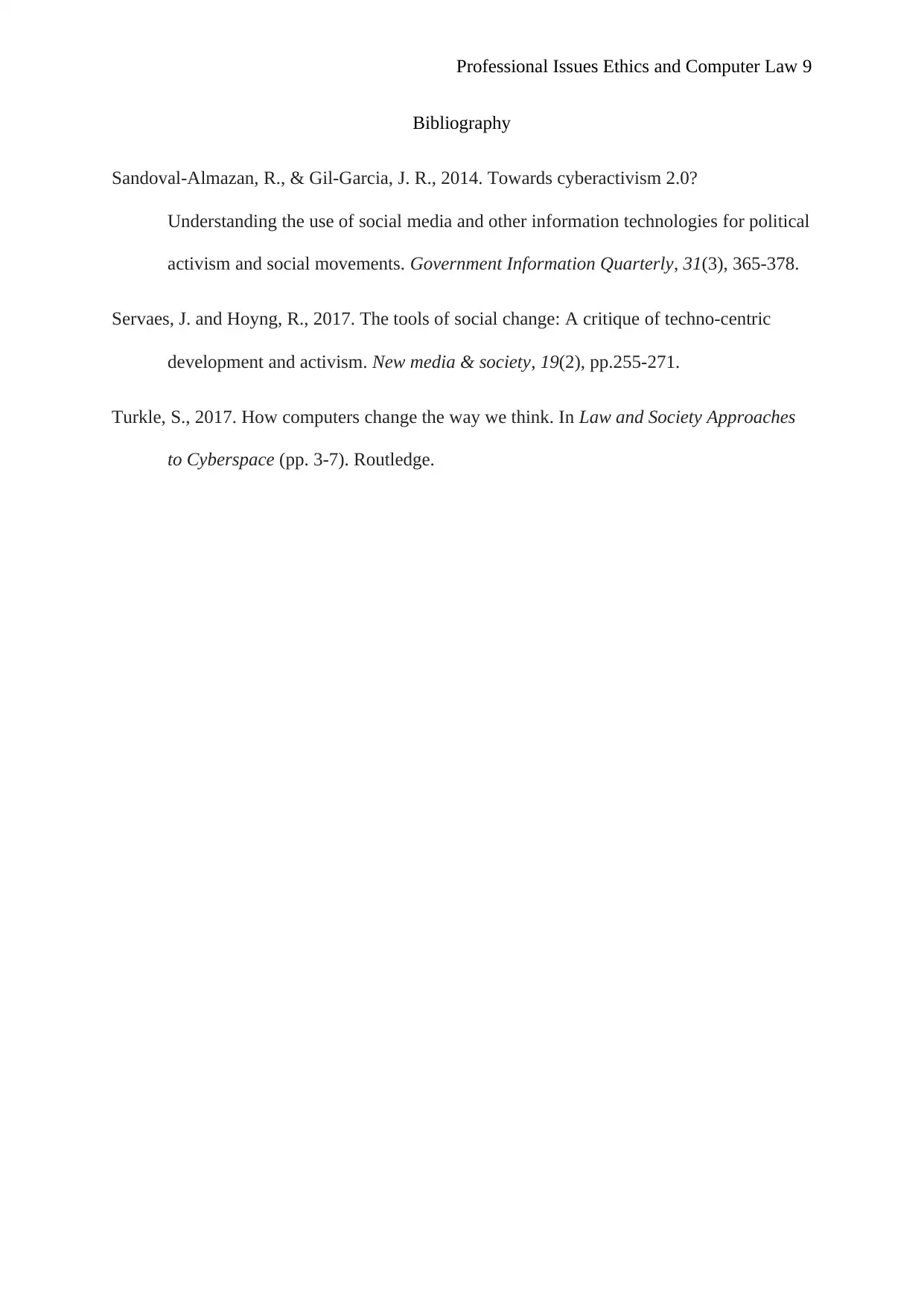
Professional Issues Ethics and Computer Law 9
Bibliography
Sandoval-Almazan, R., & Gil-Garcia, J. R., 2014. Towards cyberactivism 2.0?
Understanding the use of social media and other information technologies for political
activism and social movements. Government Information Quarterly, 31(3), 365-378.
Servaes, J. and Hoyng, R., 2017. The tools of social change: A critique of techno-centric
development and activism. New media & society, 19(2), pp.255-271.
Turkle, S., 2017. How computers change the way we think. In Law and Society Approaches
to Cyberspace (pp. 3-7). Routledge.
Bibliography
Sandoval-Almazan, R., & Gil-Garcia, J. R., 2014. Towards cyberactivism 2.0?
Understanding the use of social media and other information technologies for political
activism and social movements. Government Information Quarterly, 31(3), 365-378.
Servaes, J. and Hoyng, R., 2017. The tools of social change: A critique of techno-centric
development and activism. New media & society, 19(2), pp.255-271.
Turkle, S., 2017. How computers change the way we think. In Law and Society Approaches
to Cyberspace (pp. 3-7). Routledge.
⊘ This is a preview!⊘
Do you want full access?
Subscribe today to unlock all pages.

Trusted by 1+ million students worldwide
1 out of 9
Related Documents
Your All-in-One AI-Powered Toolkit for Academic Success.
+13062052269
info@desklib.com
Available 24*7 on WhatsApp / Email
![[object Object]](/_next/static/media/star-bottom.7253800d.svg)
Unlock your academic potential
Copyright © 2020–2026 A2Z Services. All Rights Reserved. Developed and managed by ZUCOL.




